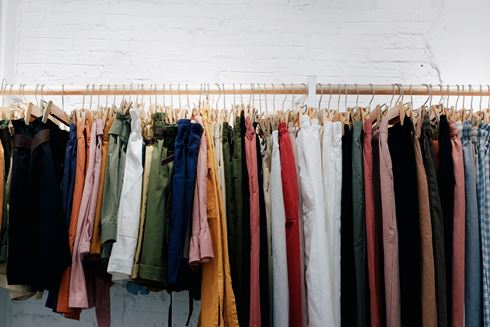The Danish Technological Institute has urged textile manufacturers, brands, academics, and recycling companies working in the fashion sector to work together to develop more circular solutions to encourage customers to adopt sustainable shopping habits. The project called ReSuit (Recycling Technologies and Sustainable Textile Product Design) gathered together the Aarhus University, Bestseller, and Naboskab and received $2 million in funds allocated by Innovation Fund Denmark.
The textile industry is a complex field, and the authorities need to work on multiple levels simultaneously to secure the sustainable fashion development of the future. Camilla Skjonning Jorgensen, Bestseller’s sustainable materials and innovation manager, stated that they joined the project because they consider ReSuit an ambitious collaboration that has the purpose of making a needed difference. This innovative project has the goal to redraw the boundaries for the fashion sector and encourage new consumer behaviour that embraces recycling technologies. Damaged, worn, or new clothes that are threw into garbage will be broken down into new fabrics and included in a circular economy with the purpose to be reused.

Why it’s vital for the ReSuit project to succeed?
Denmark started this essential initiative as the fashion industry represents 20% of pollution and industrial water contamination worldwide. By 2050, the fashion sector is expected to double pollution and water contamination, becoming the second-largest source of pollution globally. Fibre dyeing is an operation that triggers major water pollution. ReSuit encourages businesses and consumers to change their practices and adopt sustainable ones. There is a burning need to lower the textile’s sector impact on the environment by committing to clean techniques, up-gradation of machinery, automation, and effective mechanisms to reuse the water polluted during the fabrication process.
Footwear, clothes, and household textiles cause greenhouse emissions, pollution, and landfill. Denmark started the ReSuit project because fast fashion (new clothes at cheap prices) triggers a significant increase in the quantity of discarded clothes. The European Commission adopted a circular economy action plan in March 2020 to stimulate key players in the industry to come up with innovative solutions to slow down the movement of the sector towards becoming the second-largest pollutant in the world. Their plan integrates strategies that European countries should use to recycle and reuse textiles, stimulate recycling and reuse, and demand organisations and individuals take all necessary measures to achieve an eco-friendly, carbon-neutral, toxic-free and circular economy by 2050. The European Commission adopted stricter rules regarding the use and consumption of materials and asked for new regulations against microfiber loss and standards more stringent for the amount of water used to produce textile articles. A single T-shirt requires 2700 litres of water during production. Enough drinking water for one individual for 2.5 years. And besides the large consumption of water, the textile industry is also responsible for water pollution. Washing synthetic fabrics release 0.5 million tonnes of microfibres into the ocean annually. Washing and cleaning synthetic clothes cause 35% of the primary microplastics that end up in nature.
Multiple key players in the textile, consumer behaviour, and tech sectors have joined forces to start this innovative project to change the world of clothing design and make it more circular. The way people get rid of unwanted textiles has to change. Only 1% of clothes are recycled as clothing worldwide due to the lack of adequate technology. People find it easier to throw them into the garbage rather than donating or recycling them. Learn more about what it takes to recycle.
What should you know about ReSuit?
The project’s focal point is sustainability in the textile sector and recycling of the textile waste in Denmark. As stated before, the Consortium includes names from the textile and clothing sectors (Bestseller, Designskolen Kolding, and Elis), recycling technologies industry (Aarhus University, Danish Technological Institute, Fraunhofer), consumer behaviour sector (Naboskab), and Raw material production industry (A/D Dansk Shell). Anders Lindhardt from Danish Technological Institute, who supervises the project’s operations, stated that 100 billion textile items are produced globally, and people dispose of them without considering recycling. The industry loses 400 billion euros because it lacks recycling technology and infrastructure. Lindhardt revealed that the program’s goal is to introduce all textiles from Denmark in a chain where they become raw materials or new textiles.
ReSuit promotes conscious buying and sustainable textiles
The project enunciated a couple of observations regarding design, highlighting that the focus should be on sustainable design, with clothes being created with recycling in mind. A list of which additives and colours should be used in textile production is necessary, together with an assessment of their significance for recyclability. The first task the project must complete is phasing out the substances that don’t meet sustainability requirements. Circularity is essential in the textile sector. Denmark needs disruptive innovation to achieve its goals and create circular solutions. The key participants in the project are aware that they are trying to change a complex field, so they have started working in diverse lines simultaneously.
ReSuit can be defined as a multifaceted collaboration that created circular principles into a meaningful context to produce the proper technologies to achieve the desired goal. While textile organisations work to provide the required solutions and environment for recycling and reusing clothes, Naboskab, the organisation specialising in understanding and changing customer behaviour, must identify the most effective ways to motivate customers to join their project.
Final thoughts
ReSuit draw attention towards the enormous quantities of textile and clothes Danish residents throw away annually, 85.000 tonnes. Starting with 2022, Denmark will sort textiles separately, and it’s expected from 2025, the other European countries to follow its examples. Polyester clothes make up for half of all clothing items worldwide, and it’s vital to develop technologies that purify the fabrics and recycle them in safe conditions.
The sustainable textile industry also has the potential to boost the European economy that finds itself in an economic crisis.


